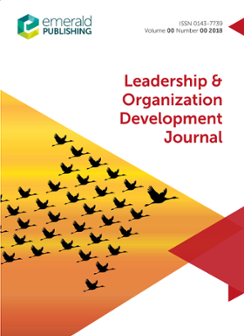Table of contents
Transformational leadership promoting employees' informal learning and job involvement: the moderating role of self-efficacy
Muhammad Qamar Zia, Julian Decius, Muhammad Naveed, Adnan AnwarThe aim of this study is to investigate the relationships between transformational leadership (TL), informal learning and job involvement. The study delineates two pathways from…
How servant leadership affects organizational citizenship behavior: the mediating roles of perceived procedural justice and trust
Shaoping Qiu, Larry DooleyThe paper aimed (1) to examine the mediating effects of procedural justice perception and trust in leaders between servant leadership and customer-oriented organizational…
Exploring the predictor and the consequence of digital organisational culture: a quantitative investigation using sufficient and necessity approach
Astadi Pangarso, Alex Winarno, Pramitha Aulia, Dinda Aulia RitongaDigital organisational culture is essential for organisations in the digital era. However, examination of the role of digital organisational culture in government institutions…
How to match mentors and protégés for successful mentorship programs: a review of the evidence and recommendations for practitioners
Connie Deng, Duygu Biricik Gulseren, Nick TurnerThe purpose of this qualitative review paper is to identify for practitioners ways of matching mentors and protégés to enhance the effectiveness of formal mentoring programs.
The mediating role of innovative climate on the relationship between transformational leadership and firm performance in developing countries: the case of Ghana
Albert Puni, Sam Kris Hilton, Ibrahim Mohammed, Eric Sanford KorankyeInnovative climate has now become a necessity to developing creative behaviours amongst employees. Hence, this study examines the mediating role of innovative climate on the…
Ambition: a deterrent to workplace deviance among narcissistic leaders
H. Kristl Davison, Phillip W. Braddy, John P. Meriac, Robert Gigliotti, Daniel J. Detwiler, Mark N. BingWorkplace deviance remains a concern for many organizations, and narcissism has been identified as a primary contributor. The purpose of this paper is to investigate whether…
New venture top management team's shared leadership and its indirect effect on strategic performance: findings from SEM and fsQCA
Jun Yu, Zhengcong Ma, Wenhao SongThe purpose of this study is to empirically explore the relationship between a new venture top management team's (NVTMT’s) shared leadership and strategic performance in…
Paradoxical leadership as a moderating factor in the relationship between organizational silence and employee voice: an examination using SEM
M.M. Sulphey, K. Mohamed JasimParadoxical leadership (PL) is a style that can bring stability and flexibility simultaneously, which helps organizations to manage the uncertain external environment. The purpose…
Fostering exploration and exploitation behavior in management teams to enhance organizational performance: the LearnOvation leadership development program
Sofia Kjellström, Kristina Areskoug Josefsson, Anna Fabisch, Charlotte Forsberg, Thomas Schneider, Gunilla AvbyThe purpose of this paper is to assess the impact and effectiveness of the LearnOvation leadership development program in the welfare services sector in Sweden.
Supervisor expectations regarding work-related messages: their differential effects among remote and on-site workers
Nicolas Gillet, Alexandre J.S. Morin, Stéphanie Austin, Tiphaine Huyghebaert-Zouaghi, Claude FernetResearch suggests that supervisor expectations regarding the need to respond quickly to work-related messages (SE) tend to be positively related to employees' levels of emotional…

ISSN:
0143-7739Online date, start – end:
1980Copyright Holder:
Emerald Publishing LimitedOpen Access:
hybridEditors:
- Professor Martin McCracken
- Prof Paul Humphreys